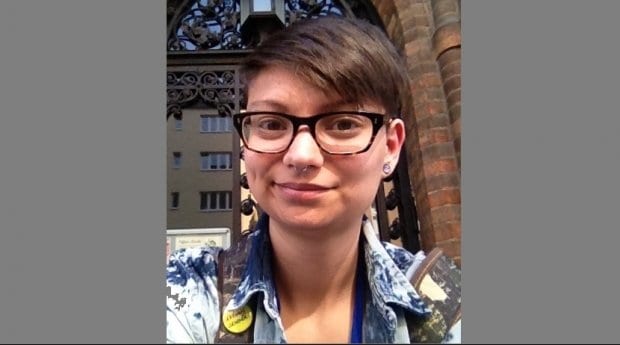For Kole Peplinskie, reclaiming indigenous identity is closely linked to reclaiming gender identity.
In the past year, Peplinskie, who’s studying sociology and women’s studies at the University of Ottawa, has been giving workshops with Jer’s Vision on fighting bullying, undoing colonialism and being two-spirit. Peplinskie, who uses the pronoun “they,” is a two-spirit Algonquin from Eagle Village First Nation.
“The term two-spirit started at a Winnipeg conference for the LGBTQ community for indigenous folks in 1990,” they say. “It was their own way to reclaim terms that had been lost through colonization. Two-spirit means someone who has both a male and female spirit. Traditionally, all communities recognized two-spirit people, but through colonization, the words in our own languages have been lost for these people.”
On Jan 19, Peplinskie is giving a workshop called Innovative Identities: Two-Spirit at Carleton University’s Gender & Sexuality Resource Centre. The workshop is part of a week of events celebrating Carleton Pride 2015.
For indigenous people, being two-spirit can mean identifying as queer or genderqueer or both, Peplinskie says.
“The term two-spirit doesn’t only have to mean that you identify as having more than one gender or non-binary or genderqueer — it can also be for anyone who’s indigenous and fits under the queer umbrella,” they say.
There’s a strong link between sexuality, gender identity and decolonization, Peplinskie says. Colonization and the residential school system deprived indigenous people of their languages and cultures while shaming them for their identities, including their gender identity, they say. For an indigenous person, coming to terms with one’s sexuality and gender identity often means reconnecting to traditional teachings, Peplinskie says.
“I grew up off-reserve in a very colonized environment,” they say. “I didn’t really have a connection with my traditional past. I started questioning my gender identity and sexual orientation when I was 18. I didn’t really have a comfortable word for it, and when I started reclaiming my indigenous identity and started learning the traditional teachings, I heard the word ‘two-spirit,’ and an elder told me that I am two-spirit because I identify within the queer community and I am indigenous, First Nations.”
Going into schools to give workshops is an encouraging experience because of the students’ reactions, they say.
“I’ve done workshops in elementary schools,” says Peplinskie, who starts off talking to students about sexism and bullying before seguing into gender identity and sexual orientation. “We don’t give kids enough credit, but they’re smart, and they will understand that and digest that information. It really changes a lot of things.”
Having to constantly correct people’s use of pronouns can be a difficult and sometimes unsafe experience, but if people learned about gender identity from an early age, it would be safer and easier for everyone, they say.
“We just need to stop assuming people’s gender,” Peplinskie says. “I think there just needs to be more education, especially at the elementary [school] level, that not everyone fits into those check boxes of boy and girl and that it’s okay. Some people go from one check box to the other. Some people are in the middle.”
In addition to Peplinskie’s workshop, Carleton Pride is hosting workshops on queer fan fiction, dance, sex toys and art, concluding on Jan 23.
Innovative Identities: Two-Spirit Workshop
Carleton University’s Gender & Sexuality Resource Centre
Mon, Jan 19, 11am–1:30pm


 Why you can trust Xtra
Why you can trust Xtra


